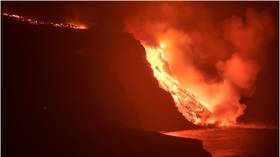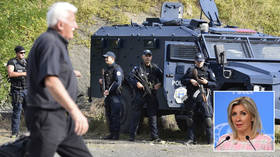Toxic gases feared on Spain’s Canary Islands as lava from devastating eruption reaches Atlantic Ocean (VIDEOS, PHOTOS)

The molten lava flowing from a volcano on Spain’s Canary Islands has reached the Atlantic Ocean. Experts are warning that lava’s contact with ocean water can release toxic gases.
The lava from the Cumbre Vieja volcano on the island of La Palma reached the ocean near the town of Tazacorte shortly after 11pm local time on Tuesday, news channel TVE Canarias reported.
The volcano, which began erupting on September 19, has been ejecting massive flows of lava that have destroyed crops, roads, houses, and villas in the countryside.
Amanece en La Palma y comienza a formarse un delta de lava que poco a poco gana terreno al mar. pic.twitter.com/KNg6jy5Y4K
— Instituto Español de Oceanografía (@IEOoceanografia) September 29, 2021
Videos shared on social media show that a delta has formed as red-hot lava continues to move down the coastal cliff and slide into the water.
Caída de colada de lava del volcán de #LaPalma desde el acantilado al oeste de Todoque. Formación de cono de depósitos volcánicos y nubes de vapor de agua y desgasificación en campaña de @IEOoceanografia@gemar_ieo@sgeologica@IGME1849@IGeociencias@VulcanaIEOpic.twitter.com/zV3nDhcAys
— Juan-Tomás Vázquez (@JuanTVaz) September 28, 2021
The islands’ emergency services have urged everyone in the area to look for “a safe place” and stay there.
Volcanologist Claudia Rodriguez told local media that, due to a vast difference in temperatures, a “thermal shock” occurs when lava comes into contact with seawater. “This is why columns of water vapor are being produced, but they are loaded with hydrochloric acid as the result of the presence of chloride in seawater.”
Observamos en directo el avance de las lavas hasta el pie del acantilado costero que proceden de la colada sur del volcán de La Palma.Se está generando un impresionante depósito de más de 50 m de altura.#VulcanaIII_0921@IEOoceanografiapic.twitter.com/jpRn9JIQ4G
— Geociencias Marinas (IEO) (@gemar_ieo) September 28, 2021
Science journalist and volcanologist Robin George Andrews told the BBC that gas plumes created on such occasions can cause eye, lung, and skin irritation, but he said this should not be a problem if locals keep their distance.
Canary Islands President Angel Victor Torres also warned about the clouds of toxic gases. He expressed hope that lava will continue to flow into the ocean, rather than keep spreading on the surface.
More than 650 houses have been destroyed by the lava flow as of Wednesday, according to the EU’s Copernicus Emergency Management Service. Over 6,000 people were evacuated, and no one was killed.
The last eruption on the Canaries occurred in 1971, which was the last surface eruption on Spanish soil.
Also on rt.com Intensifying volcanic activity’ forces evacuation of THREE MORE La Palma townsThink your friends would be interested? Share this story!














